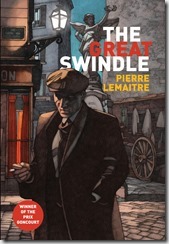 |
THE GREAT SWINDLE
Pierre Lemaitre (www.pierrelemaitre.com) Translated by Frank Wynne (www.terribleman.com) MacLehose Press (maclehosepress.com) £18.99 |
As the Great War approaches its end, Lieutenant Henri d’Aulnay-Pradelle decides to make one last bid for glory. Sending two scouts over the top, he shoots them in the back, and uses their deaths as the perfect excuse for one final push against the enemy. When Albert Maillard discovers what he has done, he almost dies as a result, buried alive in a shell crater. After the war, Albert and Édouard Péricourt, the man who saved him from his fate, and suffered a terrible mutilation as a result, live together in poverty, all of their money going towards the morphine that Édouard needs in order to keep functioning. Pradelle, meanwhile, is living the life of luxury, having married into the rich Péricourt family, who believe Édouard to be dead. His business – the exhumation of dead French soldiers from temporary graves and relocation to government-sanctioned war graves – is booming, but Pradelle is less interested in how the result is achieved than in the money it brings. Albert and Édouard, meanwhile, have come up with the perfect plan to make money, a scheme that will see them swindle the whole of France to fund a comfortable retirement to the colonies.
In a massive departure from the work that made his name, the Camille Verhoeven novels, Pierre Lemaitre turns his attention to France in the interwar period, beginning with the final days of the First World War in October and November 1918. It is here, in the trenches in rural France, that we meet the trio of characters whose stories The Great Swindle will tell: on the one hand, the timid Albert Maillard, a peacetime bank-teller turned soldier who has seen his share of action, having been wounded in the Somme; on the other hand is Henri d’Aulnay-Pradelle, a man who “reeked of money and looked like a crook”, a man from a rich background playing at war, and hoping for glory and advancement through the ranks. The third man is Édouard Péricourt, the son of a rich Parisian, an artist and flamboyant homosexual who has been disowned by his father, and sought escape in the ranks of the French army. The fates of these three men become inextricably entangled during the taking of Hill 113, and their futures are decided when Albert quite literally stumbles upon evidence of Pradelle’s betrayal of the unit.
Of the three, Albert seems the most level-headed, despite the terrible nightmares that haunt him following his near-death experience at the bottom of a shell crater filled with mud. He has been changed by this war, a man trying to earn a living in a country where he is essentially persona non grata: those who died for their country are the heroes; those who returned are failures, men who went off to fight for their country and couldn’t even die. Albert has the additional burden of the severely disfigured Édouard, a man to whom he owes his life, and who he nurses through the pain and the subsequent, inevitable, morphine addiction. Lemaitre spends little time in Édouard’s head; it’s a dark place and, though we feel sorry for this man whose life essentially ended in those final days of the war, we can’t help but despise him for his treatment of Albert, and for the coming betrayal that seems obvious to us from early on. The final corner of this strange triangle, Pradelle is the embodiment of evil, a schemer out to make money at the expense of others and who chooses his friends based on their contacts and influence. As another character notes,
[…he [Pradelle] was a loudmouth, a chancer, a rich bastard, a cynic – a word much in vogue sprang to mind: “profiteer”.]
He is a character that it is easy to hate, and when his world starts to crumble – as his swindle is uncovered by the fascinating civil servant Joseph Merlin – it is with no small amount of glee that we stand back and watch.
The Great Swindle of the title is the plan put in place by Albert and Édouard to sell fake war memorials and abscond with the money before anyone realises what has happened. Albert is initially against the idea, while Édouard is filled with excitement and enthusiasm – at least, outwardly. Unlike Pradelle’s con, which is based on a real scandal, the war memorial swindle is the creation of Lemaitre, but it is beautifully-constructed and entirely believable, a hangover, perhaps, from the involved plotting required for the Verhoeven novels.
Lemaitre’s style is evident throughout, and The Great Swindle is an exciting mix of light-hearted caper and dark examination of a country – and a people – recovering from one of the darkest periods of human history to date. Alongside the clever money-making scheme, the author examines the psychological effects of the war on three very different individuals who came out of the war with very different experiences, and in various states of mental and physical “completeness”, for want of a better word. The story – and the post-war France – is fleshed out with a host of other characters whose interactions with the central trio drive the story to a rewarding and tear-inducing climax. Characters like Marcel Péricourt, the father of Édouard, a man who believes his son has been killed in the trenches, and who is learning how much he has lost through re-discovery of his son’s art and the few memories that he retains; Léon Jardin-Beaulieu, Pradelle’s business partner and a man whose sister and wife are both sleeping with the handsome ex-soldier; and Joseph Merlin, the dishevelled civil servant tasked with inspecting the grave sites for which Pradelle is responsible, and whose gruesome discoveries will lead to one of the biggest scandals France has ever seen. Merlin is an odious man, in every sense of the word, but he is also one of the novel’s standouts, a beacon of honesty in a world gone mad with greed.
I was disappointed with the final book in Lemaitre’s Camille Verhoeven trilogy, feeling that he might have given his best for the first two books of the series. In The Great Swindle he has redeemed himself and proven that he has much more to offer. While very different from his modern day crime trilogy, this latest novel is quintessential Lemaitre: beautifully-written, carefully structured and filled with characters that we love or hate with the same intensity that we might if they were real. It’s an examination of a dark period in French history through the eyes of these people, while still allowing us to see the funny side of things. The first in a proposed 7-book series set to span the interwar period, this fun and intense read (an interesting combination that works extremely well) The Great Swindle puts Pierre Lemaitre firmly back on my must-read list. It is one of the best books I’ve read this year and it’s sure to be a book we’ll be talking about for some time. Not to be missed.

Hi, my comment didn’t post, trying again. I just finished The Great Swindle and loved it. Thank you for your review which gives me the clue I am looking for that Louise will return in futures books. What a tease in the epilogue! Based on your review, there will be more books coming; perhaps she is to feature? Am I on the right track?
Hi Heather,
Glad my review helped answer some of your questions – and that you enjoyed the book! Definitely one of my favourites of the year. Unfortunately, beyond the fact that this is the first of a proposed 7-book series, I don’t really know much more, so have no idea who will or won’t make an appearance in the next book(s). Hopefully we won’t have too long to wait to find out!
Best,
Matt
Thanks Matt!